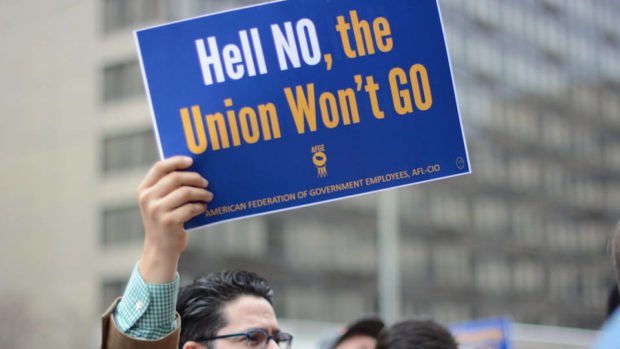Why There Is No Moral ‘Right To Strike’

“The right to strike is a fundamental human right.” That quote was attributed to someone on strike in a story about recently heightened labor unrest in America, including unionization campaigns, efforts to raise minimum wages, and even the Hollywood writer’s strike.
That claim seems to be broadly accepted, given how little opposition to that claim can be found in popular discussion. And that plays an important role in influencing public policies. If one starts from the belief that striking is an expression of one’s legitimate human rights, then accepts the often-repeated claim that workers are unfairly at the mercy of “big, bad business” in exercising those rights, all sorts of public policies to support unions and strikes can seem reasonable.
California is providing a good example, as the writer’s strike has worn on. As reported by the Los Angeles Times, “California lawmakers are resurrecting legislation that would allow workers on strike to collect unemployment benefits.” An early version of SB 799 would make striking workers eligible to collect unemployment benefits after two weeks.
If you start from the perspective unions wish people to hold, this law sounds like, “we’re supporting workers,” which many will think is noble. But if people instead saw these benefits as something that should be reserved for genuine unemployment, it starts to sound more like an abuse of California’s state unemployment system, already over $20 billion in debt.
Someone’s support for the proposed legislation might waver as a result, but in our time when people often desperately want to be seen as moral and/or ethical by others (who think such “help” is justified), they might remain in favor of such legislation. However, what if they realized that “There Is No Moral Right to Strike,” as Leonard Read (founder of the Foundation for Economic Education) wrote in his 1969 book, The Coming Aristocracy? That might lead some to realize that the legislation in question actually supports immoral behavior. As Read put it there,
The present laws of the United States recognize the right to strike; it is legal to strike. However, as in the case of many other legal actions, it is impossible to find moral sanction for strikes in any creditable ethical or moral code.
Read focused on what he saw as the major source of confusion on this issue—the difference between the right to quit, singly or as a group, and the right to strike, which goes much further. He recognized that the right to quit, singly or as a group, involves no coercion of others and violates no one else’s equal rights to offer their labor or goods and services in willing exchanges. In contrast, strikes rely on coercion which allows strikers to violate others’ equal rights.
Quitting is not striking, unless force or the threat of force is used to keep others from filling the jobs vacated. The essence of the strike, then, is the resort to coercion to force unwilling exchange or to inhibit willing exchange. No person, nor any combination of persons, has a moral right to force themselves—at their price—on any employer, or to forcibly preclude his hiring others.
Read made his point with an illustrative example.
An individual with an ailment employs a physician to heal him. The physician has a job on agreeable terms. Our sense of justice suggests that either the patient or the physician is morally warranted in quitting this employer-employee relationship at will, provided that there be no violation of contract. Now, assume that the physician (the employee) goes on strike. His ultimatum: “You pay me twice the fee I am now getting or I quit! Moreover, I shall use force to prevent any other physician from attending to your ailment. Meet my demands or do without medical care from now on.” Who will claim that the physician is within his moral rights when taking an action such as this?
Read emphasized that a job is the result of a willing exchange between parties, not something a worker “owns” in the absence of contractual agreement or continued willingness by the employer. But a right to strike asserts not just ongoing ownership of one’s current job even in the absence of employer agreement. It asserts a new right they did not have when they entered their employment relationship—the ability to deny all others the right to compete for that job, even if both that worker and the employer would agree to it. Consequently, “The right to a job that has been quit is no more valid than the right to a job that has never been held.”
Leonard Read concluded that the censure for the adverse consequences for individuals’ rights and social cooperation that arises from both threatened and imposed strikes belongs somewhere different than is commonly believed today—on “the false idea that there is a moral right to strike.”
If people recognized that was the case, their support for unemployment benefits for strikers in…
Read More: Why There Is No Moral ‘Right To Strike’

